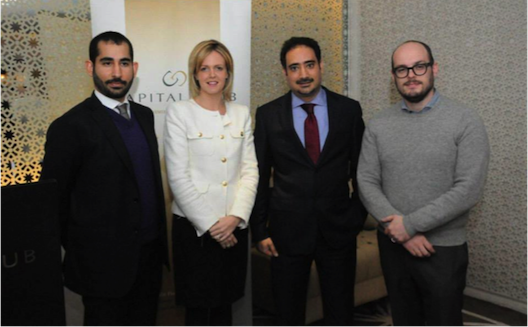Bahrain Young Entrepreneurs Forum: 'Barriers to business need to come down'


Attendees of Bahrain's Young Entrepreneurs Forum
Jetlagged, I arrived at the Capital Club — a premiere private business club at the iconic Bahrain Financial Harbor where Bahrain’s movers and shakers convene — for a ‘Young Entrepreneurs Forum’.
Despite the impressive panel and moderator — most of whom I know personally — entrepreneurship events can sometimes veer to the formal side, without really getting into the honest and candid discussions that are necessary.
So I sat down as the moderator, Julia Atherton-Dandy, General Manager of Hill & Knowlton Strategies, introduced the panelists, bracing myself for a conventional 10-15 minute presentation per speaker and 15-20 minutes for questions.
The Panelists:
- Greg Hughes, CEO Nans Group & Zest Media
- Amin Al Arrayed, General Manager of First Bahrain Real Estate Development Company KSC (disclosure: First Bahrain is a client of my social enterprise 3BL).
- Aymen Almoayed, Chairman and Managing Partner of Almoayed Chambers
What followed, to my delight, was a very engaging and thoroughly enjoyable discussion between the panel and the audience.
The conversation kicked off on the topic of Tamkeen — which has become synonymous with both supporting startups and the laborious procedures its well-intentioned support schemes entail.
From my personal experience with Tamkeen, getting support can be a somewhat bureaucratic process requiring a lot of patience — and sometimes even lobbying.
Yet some people have abused the system by taking advantage of these government subsidies that support entrepreneurs’ marketing and promotion costs, consultancy, technical equipment purchase and a number of other startup costs.
“All I know,” said Hughes, “is that people wanting to advertise with us spend months waiting for Tamkeen funding then once it comes through they spend it very quickly!”
Almoayed quickly chimed in to ask, “Is it socialist to help the company regardless of merit?” Indeed I think these are necessary debates that policymakers need to be having.
“If you received Tamkeen’s assistance for marketing, cooking utensils for your restaurant, Ministry of Labor employee salary subsidies and you still didn’t make it, maybe it’s your business!” Almoayed said, without sugar-coating it.
Tamkeen helped more than 600 startups last year, which — as an entrepreneur myself — I deeply appreciate. But I can’t help but question whether people are getting too much support and draining government resources.
Should support focus more heavily on growth versus initiation? Should support be reserved for actual entrepreneurs versus owners of another salon or cupcake shop — unless there is a particular innovation in said salon or cupcake shop with plans for regional market expansion and domination?
And yes, cupcakes did make into the debate — as they always do here — with Almoayed joking that Bahrain, which used to be known as the island of a million palm trees, is now the island of a million cupcakes.
“Is there a cupcake millionaire in Bahrain? How many people think about business viability?” he challenged.
One explanation that Al Arrayed offered is the notion of ‘vanity projects’, where decisions to start a business are emotional versus economical. On that note, Hughes reflects that when he sees an empty restaurant — another saturated market that is metaphorically and physically bloating our economy and population — he thinks ‘that won’t be there in 3 months’. But a year later, to his surprise, it’s still there.
“You need something for the wife or the kids to do. If you get rid of the restaurant, where are they going to hang out?” Al Arrayed teased. The audience bursts into laughter, as they’re all too familiar with these ‘vanity projects’.
“Ultimately, entrepreneurship is a culture — and you can be entrepreneurial in a corporate environment. It’s about identifying gaps and underserved needs,” says Al Arrayed who personally saw a need for SME warehousing after witnessing SMEs converting villas into warehouse space.
From red tape to red carpet
Later, the debate turned back to bureaucracy. As one panelist said, “We need to work on bringing down barriers versus complaining about handouts.”
Panelists shared outlandish stories of entrepreneurs who were already running a successful graphic design business being told, when going to register the business officially, they need to have a Masters degree in Graphic Design as a prerequisite.
A renowned Bahraini tech gaming entrepreneur derided the fact that by law, he is required to have an office for a tech business!
“The largest engineering firm in Bahrain is owned by someone without an engineering degree. And the largest construction company is owned by an illiterate man,” Almoayed points out. Predictably, the audience offered the example of high school dropout-turned-billionaire Richard Branson.
The panelists and audience lament that 10 years ago, Bahrain was ahead of the curve; and that our Business Investment Center used to be a one-stop-shop where you could literally form a company in a day. Now, however, the barriers have gone up.
“Our slogan used to be ‘from red tape to red carpet’ — which Dubai took from us,” Almoayed said, before adding, “which is what we always say!” as the audience erupted into laughter.
The message from Bahrain’s entrepreneurs — many of whom are not locals — is loud and clear: we love working in Bahrain, but the many barriers to our success need to come down.


